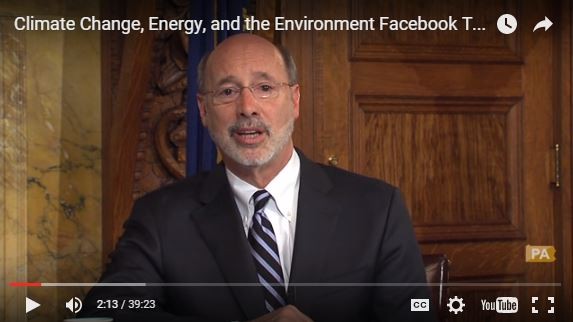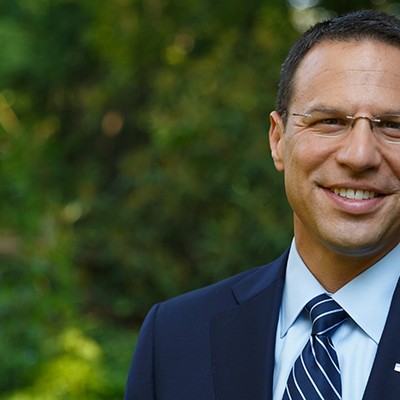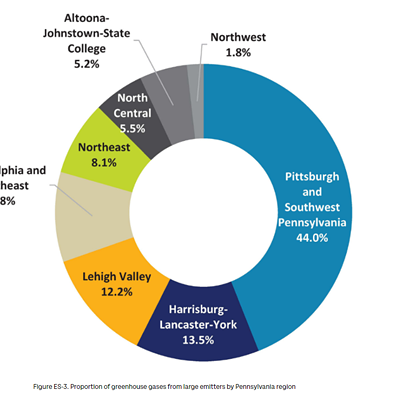Thursday, January 21, 2016
Pennsylvania Gov. Tom Wolf announces new rules on methane emissions
In an effort to fight climate change, Gov. Tom Wolf announced new rules on methane emissions in the state. The reason: According to the U.S. Environmental Protection Agency, methane, the main component of natural gas, is the second-most prevalent greenhouse gas emitted in the United States from human activities, and Pennsylvania is the nation's second-largest natural-gas producer. The plan: Wolf laid out multiple measures to curb methane leaks during natural-gas production, processing and transmission. The appeal: Wolf's administration says that companies will benefit by capturing a "salable product," even as the initiative works to reduce climate change.
The announcement came this week during Wolf's Facebook town-hall meeting, where he answered environment- and energy-related questions people posted.
"Today we're announcing a new way forward that protects our environment," he said on the live video feed. "It reduces climate change and helps businesses by reducing the waste of a valuable product ... [methane] actually has more than 25 times the warming power of carbon dioxide."
The administration's four-point plan is as follows:
- The state Department of Environmental Protection will change its permitting stipulations for oil and gas, requiring industry to use updated technology and better record-keeping, and to undergo quarterly monitoring at work sites in order to reduce methane leaks. This would apply to all oil and gas exploration, production and processing sites and facilities.
- The DEP would also require the use of Tier 4 diesel engines at compressor stations and processing facilities. These engines reduce emissions of particulate matter and nitrous oxide by about 90 percent, according to the administration's press release.
- To reduce leaks at existing oil and natural-gas facilities, DEP will develop a regulation for existing sources and submit it to the Environmental Quality Board.
- To reduce emissions along production, gathering, transmission and distribution lines, DEP will establish best-management practices, including leak-detection and repair programs.
But according the Marcellus Shale Coalition, a trade group for oil and gas companies operating in the Marcellus and Utica shale regions, the industry has already significantly reduced methane emissions.
"We welcome Governor Wolf's efforts to expand opportunities through affordable home-grown natural gas," Marcellus Shale Coalition president David Spiglemyer said by phone. "We're committed to working with lawmakers as well as state officials to focus on common-sense policies that encourage job-creating natural-gas development, which has according to EPA helped drive down methane emissions 81 percent [nationally] since 2012. It can't be overstated that shale-related methane emissions continue to steeply drop as production climbs ... We're in the business of selling natural gas, not releasing it into the atmosphere."
EPA spokesman Roy Seneca verified with EPA headquarters that the stat mentioned by the Marcellus Shale Coalition could be found on page 23 of this greenhouse gas inventory report. But Seneca noted in an email that the stat refers to just one source of greenhouse gas emissions from the oil and gas sector.
"When you include all greenhouse gases, reported emissions from the sector have gone up slightly since 2011. Finally, the Greenhouse Gas Reporting Program only collects emissions reports from the largest emitters," he wrote in the email.
When asked whether he thought the governor's new rules were redundant, Spiglemyer responded: "There's a lot of attention being paid to our industry, and it's an area we've been very much focused upon."
But DEP says it wants to make sure all companies are using the same best practices across the industry.
"What DEP wants to do is standardize the emission-reduction practices that some companies are already using, and have them be utilized across the industry," DEP press secretary Neil Shader wrote in an email to City Paper.
This past April, DEP released the 2011-2013 emissions report from the oil and gas industry, and there was a 13 percent reduction in methane emissions from 2012-2013 (methane emissions were not reported in 2011). But Shader says there are some issues with the data.
"First, we only have 2 years of it, which is not enough to definitively say there is a trend (we will have figures for 2014 in April)," Shader wrote in an email. "Second, it is self-reported, and likely does not account for all of the leaks because monitoring for leaks is inconsistent. We need to standardize measurement to make sure that the inventory is accurate and complete."
Moms Clean Air Force, an environmental-advocacy group, called the governor's announcement an "important step in protecting Pennsylvania’s children from fracking pollution." The group has been outspoken about issues related to oil and gas development, especially regarding operations that are near school facilities. The state's Secretary of Policy and Planning, John Hanger, met with the group before the governor's Facebook town hall meeting.
"We are very concerned about the VOCs that are co-pollutants with methane because that's what's harming people who are immediately near it," Patrice Tomcik of Moms Clean Air Force. She's referring to volatile organic compounds that, according to the EPA, can contribute to smog formation.
This past summer, the EPA announced measures to cut methane emissions (and VOCs), which are supposed to be finalized some time year. Environmentalists are pointing to the huge and ongoing methane leak in California as an example why the proposed EPA rules are too weak.
As for Pennsylvania's new methane rules, DEP's Shader says that the rules are still in a "regulatory concept stage" and will be discussed with the Air Quality Technical Advisory Committee in February. Then there will be a stage of drafting the regulations and holding public hearings.
Tags: Pennsylvania , Governor Tom Wolf , methane emissions , PolitiCrap , Image
















